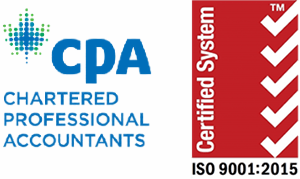If you received a notice that you were going to be audited by the Canadian Revenue Agency (CRA) today, could you provide all business records and receipts in an electronic format without blinking an eye? Or would you start feeling heart palpitations at the very thought of it?
For many business owners the latter scenario is all too real. This creates undue stress, of course, but there are many other reasons to be proactive in tracking your revenue. Here are some of the key benefits, beyond being able to sleep soundly at night!
4 Key Benefits of Proactively Tracking Your Business Revenue:
1. Audit protection and preparation. As we mentioned above, tracking your revenue ensures that you have detailed records of financial transactions. These financial records are extremely important in the event that you need to defend your tax deductions to the CRA.
2. A pulse on profitability. Keeping track of your sales revenue helps you analyze how profitable your business is. By dividing your net income by sales revenue, you can obtain your profit ratio. The profit ratio is a good measure of where your company stands financially. We can also use this data to compare your performance metrics to industry averages and determine if you have missed out on valid deductions that you may not be aware of.
3. Identifying and monitoring trends. A detailed track of your sales and revenue also helps you identify sales trends. For example, tracking your revenue reveals if your sales are impacted by certain days, seasons, etc. This is extremely important and useful for forecasting your future sales and identifying the potential peaks and valleys you need to account for. This forecasting plays an important role in your company’s budgeting as well.
4. Reporting for financial insights. The data about your sales revenue is essential in the preparation of your financial statements, including your income statement and statement of financial position (balance sheet).
How to Track Business Revenue the Right Way in 3 Simple Steps:
Now we have covered why tracking revenue is so important for your business, let’s look at how to do it efficiently and effectively. If you follow these three steps you will be able to do it easily and efficiently:
1. Create accurate timesheet invoices. Invoices are one of the most important tools for tracking your sales and revenue. They provide documentation of the services you provide to your clients, and the payments owed to you.
A related question that often comes up is:
Do I still need to create an invoice if I am using my placement agency’s time and billing program to submit my invoices?
The answer is yes. You need to have an official invoice for your records. If the agency’s tool provides the ability to create and download an invoice that is sufficient otherwise you will need to create one for your own records.
In this case, timesheet invoicing is extremely important because it allows a company to organize its finances, create wealth, and transform that wealth into a legacy. Once your timesheet is signed you will need to create an invoice and send it to your client.
2. Record your accounts receivable. According to the accrual basis of accounting, it is important to record a sale or expense when it is incurred, rather than when it is paid. This means that your revenue is not necessarily dependent on a cash transaction.
Whenever you make a sale, whether it is a credit or cash sale, it is essential to record that sale in your books. In case of credit sales, you will record an increase in your assets in the form of accounts receivable. These accounts receivable are recorded through the invoices that you generate.
There are two types of invoices: paper invoices and electronic invoices, each with their own benefits and drawbacks as outlined here:
Paper invoices versus electronic invoices the pros and cons:
a) Cost. As you may have guessed, electronic invoicing is much more cost and time efficient than paper-based invoicing. According to a survey, paper invoice errors cost companies an average of $53.50 to rectify. Additionally, research indicates that electronic invoicing can reduce your costs by 60%.
b) Time and errors. In addition to being inefficient from a productivity standpoint, paper invoices are also prone to human error. As you can imagine, fixing errors on paper based invoices is very costly. The better way is to use paperless invoicing or e-invoicing.
i. QuickBooks Online (QBO) allows you to generate sales invoices with extreme ease. It not only helps you save time, but it also allows you to create error-free invoices and also provides the option to apply discounts with a few simple clicks. It also makes keeping track of your revenue much easier.
ii. As an Elite QuickBooks Pro-Advisor, CPA4IT has the absolute lowest wholesale prices on QBO and we pass those savings on to you. Don’t forget to click here to save with our QuickBooks wholesale prices.
c) Higher business efficiency. Businesses using e-invoices have more time and less costs than those still using paper invoices due to handling and postage fees. In contrast, e-invoices can be sent immediately, and the clients get a ‘pay now’ option on the invoice itself.
i. CPA4IT also uses Xero and other cloud accounting tools which enable us to spend more time adding value and less time on paperwork. Our clients get to enjoy the benefit of our Elite Status and receive discounts on these cloud accounting services. Check out the discount we offer on Xero here.
d) Advanced personalization. E-invoices provide a greater degree of personalization compared to paper invoices. Through digital invoicing, businesses have the ability to create a different invoice template for each of their clients. This level of personalization also translates into greater customer satisfaction.
e) Reduced environmental impact. Electronic invoices are the best choice to promote environmental sustainability, reducing the carbon footprint of your business. Plus, they also reduce your need for physical storage space.
Now that we’ve covered why you need to track your business revenue, the benefits of doing it effectively, and why e-invoicing is the most profitable and productive option, our next step in the process of organizing your business will address how to generate invoices using cloud accounting software such as Quickbooks and Xero.






